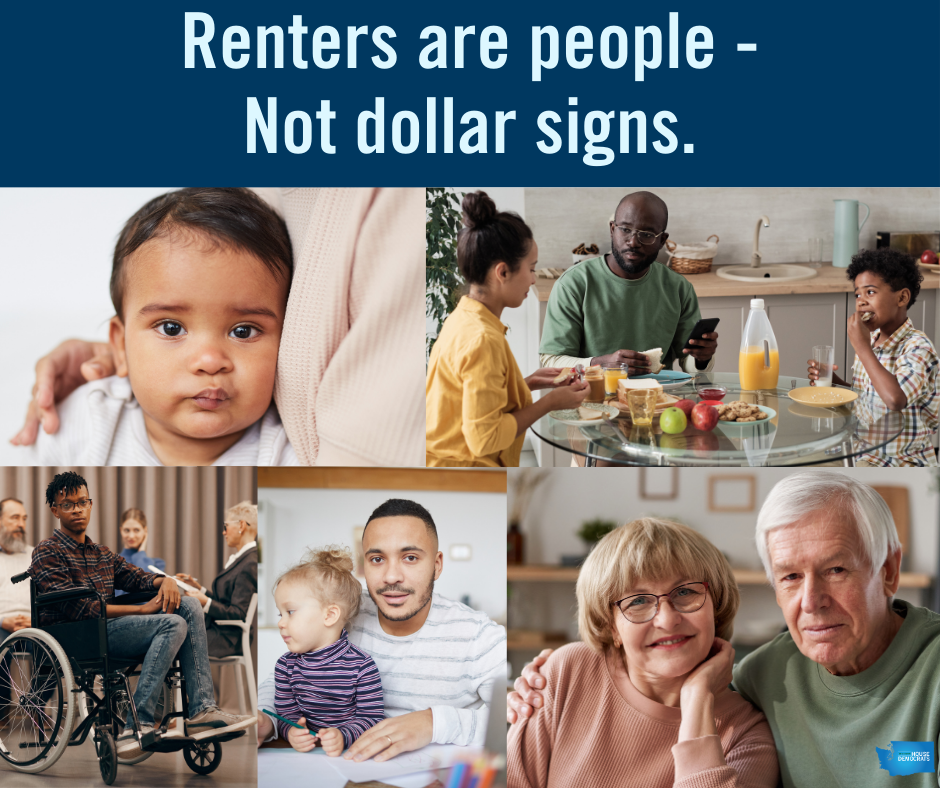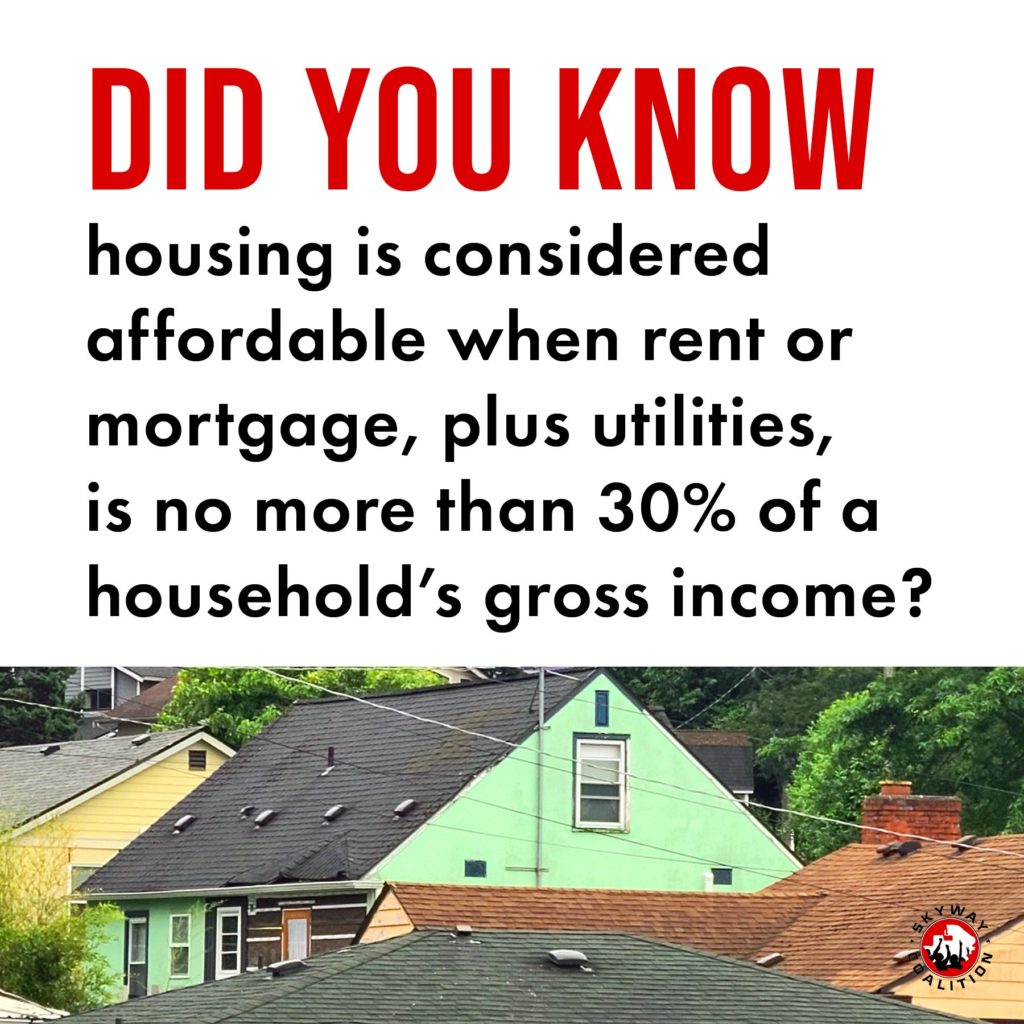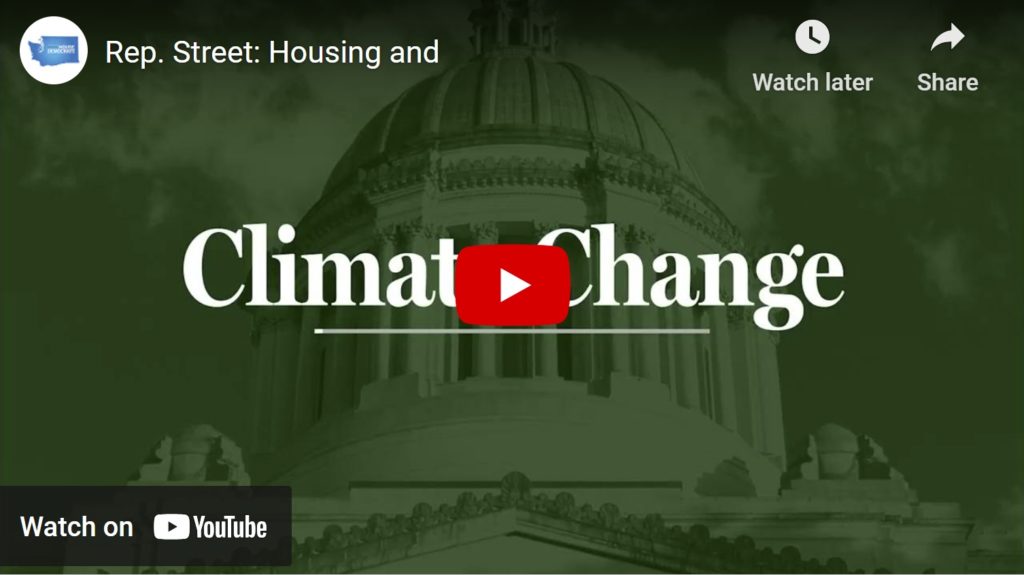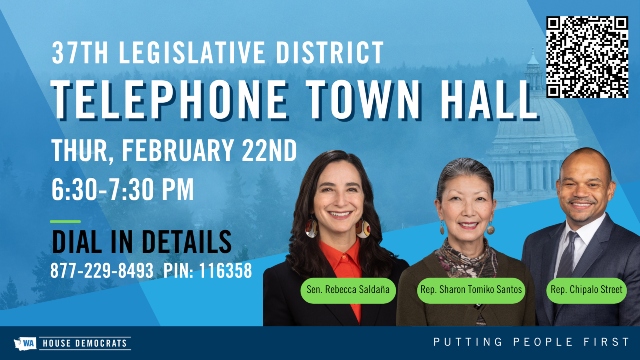Dear friends and neighbors,
It’s been a couple weeks since my last newsletter to you. We’re now in week 5 of this year’s legislative session; and this week, my fellow lawmakers and I are debating bills on the House floor into the early hours of the morning.
Today, I’d like to focus this newsletter on how I’m fighting to address our housing crisis, provide an update on one of my bills, and share a video with you on some of my priorities this year. Finally, I encourage you to join me in two weeks’ time at a telephone town hall from 6:30-7:30 PM on Thursday, Feb. 22.
Washington’s Housing Crisis

Residents in every corner of our state face the housing shortage, sky-rocketing rents, and unstable living conditions. There isn’t one single solution to these problems. It is critical that we enact regulation to immediately stabilize our housing market while we work towards long term solutions.
Supply
The housing market will only function if there is ample supply for our growing state. The Department of Commerce estimates that in the next 20 years, our state will need over 1 million more units to accommodate a growing population. Over half of those homes need to be at 50% of the area median income or below. Private developers are not providing adequate affordable housing options to meet this need. Thus, government assistance is needed to offer a full range of affordable housing options.
The Affordable Homes Act (House Bill 2276) provides a recurring stream of revenue dedicated to increasing the supply of affordable and workforce housing. It adds a 1% tax on sales of property over $3M while reducing the tax on sales of property under $750K. This is just one way we can make our tax code more progressive so that everyone in our state contributes fairly to funding affordable housing.
We also need more market rate housing so that constrained supply does not result in the exorbitant prices we see today. Last year we passed legislation which remove barriers to building sensible and familiar market rate housing options like accessory dwelling units, duplexes, triplexes, and row houses. We are continuing this work by considering legislation to allow lot splitting with limits (House Bill 1245). We are also debating allowing more expanded housing options with bills on workforce housing (House Bill 1892), co-living housing (House Bill 1998), and supporting our manufactured housing communities (House Bill 2421). We are also looking at making it easier to develop unused commercial space into residential units (House Bill 2308).
Finally, mistakes from the past must inform the manner in which we expand our housing. Our district has borne the brunt of displacement caused by upzoning. Centralizing density around transit is critical, but it can’t be done only in one area or in a manner that wipes out existing communities. Transit oriented development (House Bill 2160) ensures our state’s investment in transit is accompanied with density that doesn’t displace.
Stabilize
Regulation is not antithetical to market-based approaches. It’s fundamental to ensuring markets function. The supply side measures above will take years to produce results, but we’re in a crisis now. Regulation is overdue to ensure the housing market does not exploit people today.
The scope of the problem is staggering. According to the most recent census, 49% of the people in our district rent their home. Of those, 51% are rent burdened, meaning they spend more than 30% of their income on rent. The problem has only gotten worse since data was collected at the beginning of the decade.
Tenants in both residential and manufactured homes are facing the brunt of this crisis. Unpredictable and escalating rent increases create impossible choices. In fact, according to a 2020 study from the U.S. Government Accountability Office, for every $100 that rent increases, homelessness rates increase by 9%. This disproportionately harms families with low incomes, people with fixed incomes and seniors, and communities of color.
This year, we’re working to pass rent stabilization through House Bill 2114. Residential and manufactured home renters alike deserve the predictability and stability that homeowners with a mortgage experience. Washington residents with low or fixed incomes, those pursuing a degree or in career training, or those facing other life challenges won’t be able to budget their way out of homelessness. When the rental market is escalating at this pace, rent stabilization is a lifeline for Washington tenants.
What’s Happening with Housing in Our District

While solving our housing crisis will take time, there is also good news to report right here in our own district! Last year, my advocacy helped bring over $69M to projects in our district, $20.6M of which was dedicated to housing. The list below shows you what projects are being worked on and how much funding they received.
- Housing on Pacific Tower campus ($5M) – Youth housing and services on Beacon Hill
- Childhaven ($6M) – Affordable housing and early learning development in Skyway
- Mount Zion Housing ($1M) – Affordable housing in the Central District
- New Hope Family Housing ($325K) – Design for affordable housing in the Central District
- Rainier Court Phase V ($750K) – Affordable, family sized, apartments
- Opportunity Center at Othello Square – Affordable housing in Rainier Valley ($1.6M)
An Update on One of My Bills
 I introduced House Bill 2262 which would require that tires sold in Washington meet a minimum efficiency standard. More efficient tires can improve the gas mileage for vehicles by up to 9%. This is just one of the many steps needed to reduce our use of fossil fuels.
I introduced House Bill 2262 which would require that tires sold in Washington meet a minimum efficiency standard. More efficient tires can improve the gas mileage for vehicles by up to 9%. This is just one of the many steps needed to reduce our use of fossil fuels.
A nice side benefit of more efficient tires is consumers savings. The cost of better tires is minimal, just $5 for a set of four tires at the lowest end of the proposed efficiency standards. This is quickly recouped, and then eclipsed, by fewer trips to the pump!
Unfortunately, this bill didn’t pass out of committee this year, but the policy is contained in a Senate bill (SB 6304) that is still alive.
Video Update
 In my latest video update, I talk about some of my priorities for the 2024 session, including supporting Harborview, housing stability, and the environment. I mention a town hall, which will actually be a telephone town hall which takes place on Feb. 22, see below.
In my latest video update, I talk about some of my priorities for the 2024 session, including supporting Harborview, housing stability, and the environment. I mention a town hall, which will actually be a telephone town hall which takes place on Feb. 22, see below.
Join Us at a Telephone Town Hall

Join my seatmates and me at a telephone town hall from 6:30-7:30 PM on Thursday, Feb. 22. This is a chance for you to ask us questions about the work we’re doing in Olympia.
I’m so grateful that our delegation from the 37th has such a good relationship and holds joint events. Seeing everyone in-person at our town halls is a highlight of the year, but this one will be conducted virtually. As you may have heard, Sen. Saldana is battling cancer in addition to all the great legislative work she champions. Rep. Santos and I will support her in any way possible, and changing this town hall to be remote allows us all to participate.
I really hope you’ll call in—I look forward to hearing from you!
Thank you,

Rep. Chipalo Street
